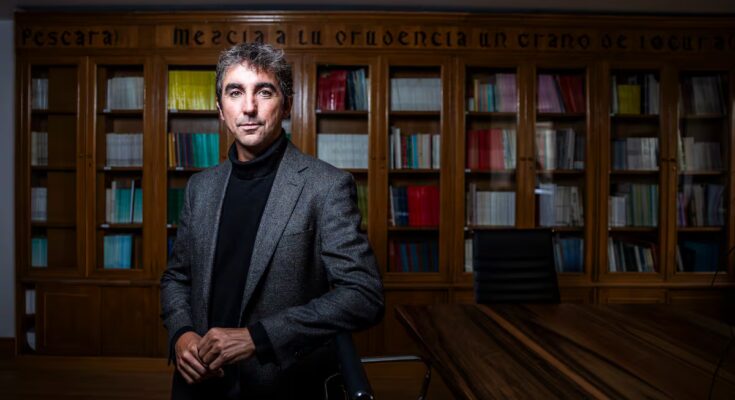José González (Madrid, 1980), psychologist specializing in mourning processes, fears death. He’s not the only one. In the training he gives to psychologists, thanatologists or palliative doctors, he asks them to write the date of their death. Then ways to avoid the topic emerge. Laughter is followed by expressions of disbelief or questions like “what year is it?” The reason is clear: “We are thanatophobic”. “We all know on a macro level what life expectancy is. And on a micro level, what do women in my family die of and at what age? At 80 from cancer. Men, at 75 from heart disease. It’s not that difficult to calculate the date of your death. If you know the date of your mortgage or when your child will become an adult, how can you not take that into account?” he asks.
If he has learned anything after training professionals from different countries and treating more than 20,000 patients, it is that society tends to avoid death. “They lift us up by turning our backs on death and the unpleasant emotions that we have to go through and digest to process the loss,” says the coordinator of the grief program of Psychologists Without Borders in an interview conducted at the Official Faculty of Psychology in Madrid. The difficulty in naming the loss of a child is an example of this phobia: “If I lose my parents, I am an orphan. If I lose my wife, I am a widower. If I lose my children, I have no name. We are so afraid that we don’t give a name.”
Humans are “not born with thanatophobia.” This fear arises in childhood. “My mother dies and I don’t take my children to the funeral home. I punish them because I leave them with a neighbor and that means avoiding the ritual. What drives me to take them to a wedding and not to the funeral home? It’s the same thing, they are rituals from one step to the next,” says González, awarded in September 2025 at the World Psychotrauma Summit for his work. This tendency to deprive children of grieving contrasts with the losses they will inevitably experience throughout their lives: “We overprotect children. And all the children, nieces, and nephews we have will have partners who abandon them, people who die, bosses who fire them, friends who betray them, or plans that don’t work. They’re all duels. What hurts is the acceptance of change.”
All cultures “need rituals to process loss.” During the confinement “there were no funeral homes and that rite was missing”. For this reason, virtual wakes and funerals have been launched. “For an avoidant person like me, if my father dies and I’m confined, it will probably be much more difficult for me to connect with the unpleasant but necessary emotions to deal with the loss: anger, rage, sadness, envy, guilt… If I go to the funeral home and they give me 100 hugs, that’s 100 opportunities to connect with that unpleasant emotion, whether I want it or not,” he explains.
In addition to allowing children to participate in these rituals, the expert recommends explaining to them that death is part of life and affects all living beings: “We will all die.” “That means that when my kids say to me, ‘Hey, Dad, Grandpa died; Mommy’s going to die; you’re going to die; I’m going to die,’ instead of being afraid or thinking that they have a trauma with the death, I should almost celebrate it because they’re integrating that concept,” she says. He also recommends talking to them about the irreversibility of death: “Grandpa’s body stops working, it’s not like a tablet that recharges, it’s like something that breaks and doesn’t come back.” When this concept is not conveyed clearly, requests arise such as that of grandfather’s return “for Christmas or for my birthday”.
The child must also know that “it has nothing to do with the cause of death.” Guilt is “the kryptonite of humans” and represents “more than 50% of the content of grief therapy sessions.” It provides a “false sense of control”: “If I find the answer to what I could have done so that my father didn’t die, I have the fantasy that others won’t die.” In couple separations, grieving people usually wonder why their partner left them, with the fantasy that “the next one won’t leave them.”
Behind many cases of anxiety or depression “hides unprocessed pain”. According to the expert, pain is one of the most common triggers of death by suicide. According to the World Health Organization, 727,000 people take their own lives every year and many more attempt it. “Human beings commit suicide because we cannot tolerate the suffering that losses cause us. The trigger can be the death of a loved one, the breakup of a relationship, a health duel, a chronic illness or a status duel.” For this reason he assures that grieving done in a healthy way is “a protective factor against suicide”.
“A bullet in the chest”
The death of a loved one is sometimes heartbreaking inside. While singers like Rozalén or Dan Reynolds describe that feeling as a “bullet in the chest” or an “abyss”, Ed Sheeran wishes heaven had “visiting hours”. To digest the loss, it is essential to get in touch with emotions such as sadness, anger or envy, a “very natural” emotion in the process: “My girlfriend leaves me, I go to a wedding with young couples and on top of that my cousin forgets that they just left me and I want food to make me feel bad. I lose my baby and in my WhatsApp group I receive a photo of my sister-in-law pregnant or at a first-year birthday party and this irritates me.”
González knows what he’s talking about because he has also experienced duels. His father died in prison. Although he is an expert in these processes, he recognizes that it is difficult for him to touch what is unpleasant. “I am a voyeur of this emotion. I am attracted to it because I see that it is useful, but I also struggle with my pain,” he emphasizes. The psychologist explains that some people develop addictions – such as to social media, sex, food, alcohol, sports or work – to avoid connecting with this pain. It is also common to hide difficult emotions. The psychologist recalls this reflection that a colleague shared with him: “The other day I monitored social media with my son and, if an alien came, he would think that on this planet we only have wine, beer and beach.”
“We must unlearn that negative emotions must be repressed and hidden,” says González. Even some professionals who are not trained in pain focus on “what still works in your life”: “You have two children, you like sports and your job, get out.” But, in reality, grief means deepening the unpleasant emotion and “accepting what is missing, not what remains”. “It’s crazy as if I were an oncologist and I told you: ‘I think you have cancer in your right breast, but I won’t do tests on you, for fear that you have cancer, I’ll do them on your left breast. I would be a terrible oncologist.”
A common mistake when accompanying someone in mourning is trying to stop their pain. González gives the example of Lupe, a mother who lost her six-year-old son: if he cries, giving him a handkerchief is “a mistake”, because it sends the implicit message of “cut off the emotion” or “dry the tears”. Accompanying is “allowing the person to experience what they are legitimately experiencing”. The expert compares it to accompanying someone who is about to vomit: vomiting cannot be caused, but it cannot be prevented either. He places a hand on her shoulder and silently gives himself permission to push out what he needs to expel.
A box of memories and other advice
Ensuring the bereaved person has an “umbilical cord” with the deceased is essential, according to the expert: “Many chronically bereaved people who remain frozen perform this function, such as maintaining a room as a shrine or going to the cemetery every day.” Instead of putting away all your clothes, the psychologist recommends creating a memory box: selecting “10 objects that connect me to my loved one”. For example “a tie he wore on holiday, a watch or a football boot because he taught me how to play”. He also suggests writing a biography and starting by defining “10 chapter titles.” “My father’s first would be ‘Post-war child’, because he was born in that period. The second, ‘Altar boy by force’, because he had no money to study and had to join a religious order.”
In grieving processes, it’s not about forgetting: “I don’t want to forget my father’s laugh, his smell or the way he sang. I want to remember him with a sustainable sadness.” Asking what the absent person would say about current issues is also a way to build “ongoing bonds”. “I know what my grandmother who died in 98 would tell me from the Internet, from WhatsApp or from the war in Ukraine or Gaza,” he says.
It is also important to “enhance relationships with the living”. González suggests that mourners imagine they only have “10 months to live” and think “what 10 things would they do.” The answers are usually “little things,” like “spending time with my kids, playing with my dog, or dancing one last time.” In general, they are activities that could be done the same afternoon, because what they want most is to “spend time without rushing with the people they love”.
If duels get complicated, it’s best to tackle them with a professional. “We are the bucket where the mourners vomit. You don’t have to worry about me, you have to vomit all the anger, the anger, the envy, the sadness and the guilt that when you leave this oasis you won’t be allowed socially, because you have to be a mother, a journalist or a partner.” Grieving the death of a child can be particularly complicated. According to the expert, many couples end up divorcing. And it’s not because they don’t love each other, but because they “process pain differently.” The same happens between families and groups of friends. This is why González insists on normalizing diversity in the forms of mourning. Everyone lives it as they can, not as they want.



